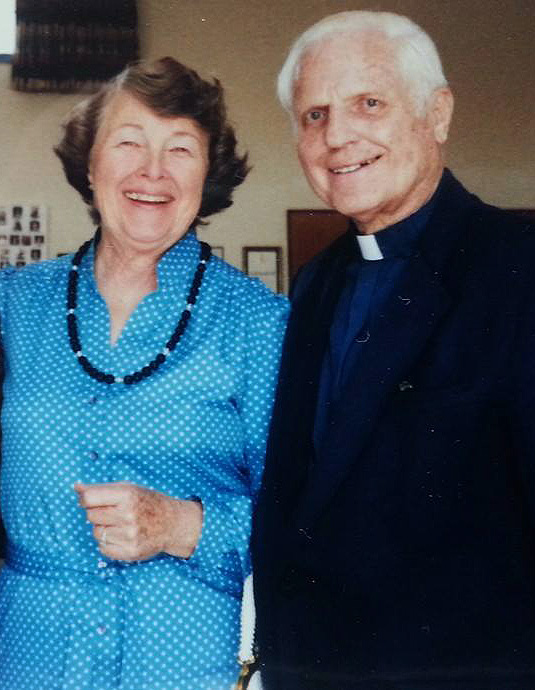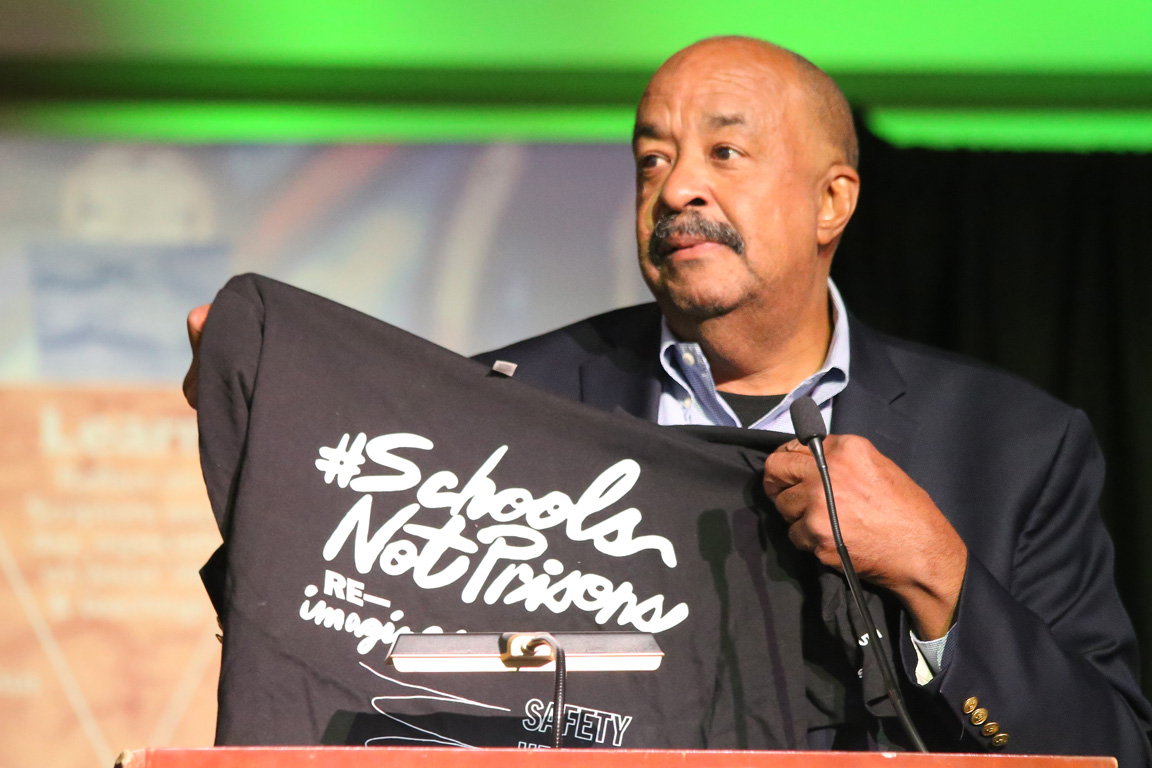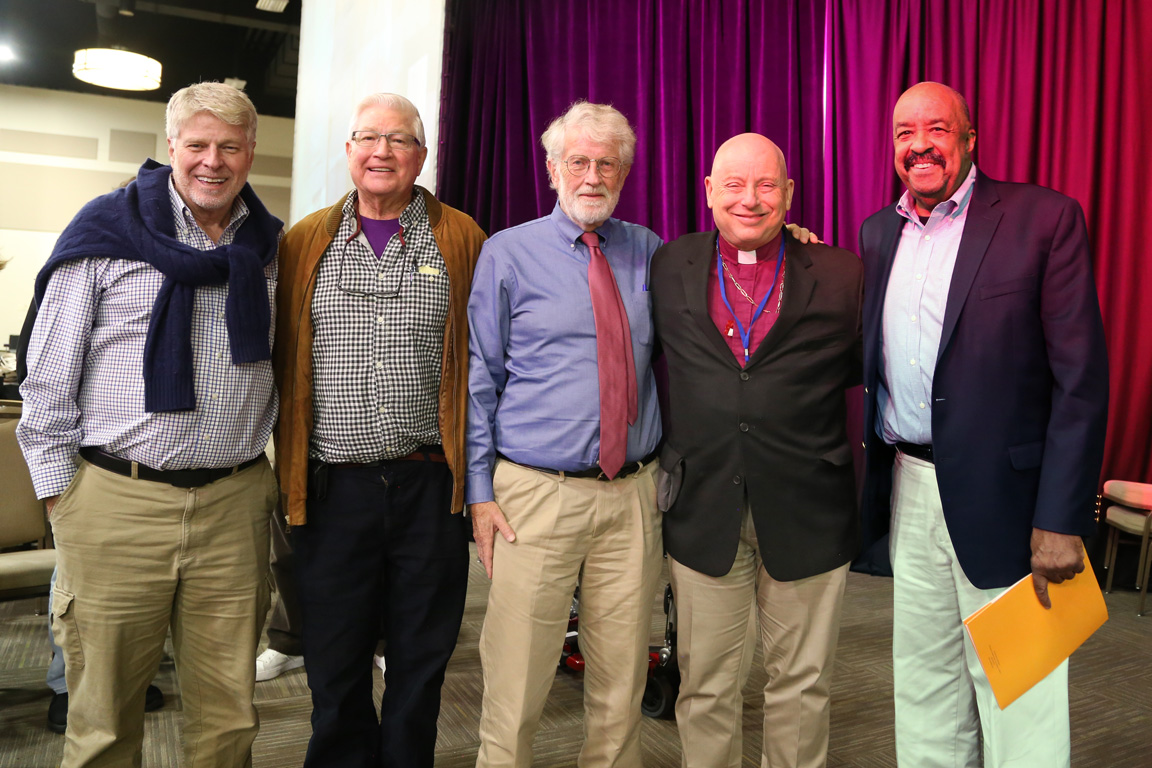
Robert Ross, M.D., president of the California Endowment, delivers the Margaret Parker Lecture on Nov. 11 at Diocesan Convention. Photos: Janet Kawamoto
[The Episcopal News] As the nation anticipates celebrating the 250th anniversary of the Declaration of Independence on July 4, 2026, “the pros of that document remain powerful and enduring and compelling – life, liberty, and pursuit of justice in a democratic republic,” Dr. Robert Ross told lay and clergy delegates attending the 128th annual meeting of the Diocese of Los Angeles in Riverside.
But “at the time the Founding Fathers signed that beautifully written and conceived document, it said ‘for all,’ but it meant ‘for some,’” continued Ross, president of the California Endowment, the largest private health foundation in the state, who delivered the eighth biennial Margaret Parker Lecture on Nov. 11.
Canon for Common Life Bob Williams introduced Ross, a physician and parishioner of St. Mark’s Episcopal Church in Altadena, who drew laughter and applause when describing his role the past 23 years as “signing checks to people who exercise God’s love.” Since its 1996 inception, the California Endowment has awarded more than 22,000 grants, investing more than $2.9 billion in community-based organizations throughout the state.
A leader in implementing the Affordable Care Act in California, Ross also chaired the Los Angeles County Task Force on Alternatives to Incarceration, “developing a strategic roadmap for the county to reform the criminal justice system in support of health-focused strategies to reduce incarceration in 2021,” Williams said.
Although Ross has announced his 2024 retirement from the California Endowment, “he’s partnered with its board of directors to raise $300 million for a first-ever social bond by philanthropy in California, designed to invest in systems-change and movement-building support of grassroots activists in social justice,” according to Williams.
Bishop John Harvey Taylor said Ross’s story “is about transformation – a great foundation transformed by his leadership, communities transformed by his philanthropy, and his own transformation as a person of deep faith in secular circles boldly putting his values to work, improving community wellness, and combating mass incarceration.
“His is a thrilling 21st-century example of a faith leader, and an Episcopalian, plunging into the thick of politics and policy and bringing beloved community that much closer.”
“The upcoming anniversary is an opportunity to make the words “for all” real. For me, it evokes God’s love as a policy agenda,” said Ross, who is African American. He challenged “the faith community in this country … to show up more powerfully than it is now, to get this nation back on track.
“If you’re watching what’s coming out of Washington lately, we’re reverting back towards ‘for some’ and not ‘for all.’ We’re seeing substantial anti-Black, anti-aging, anti-LGBT, anti-Muslim, anti-Semitic, anti, anti, anti, in this nation.”

The Parker lecture series is named in memory of Canon Margaret Parker, pictured here with her husband, Richard I.S. Parker, former rector of St. Cross Church, Hermosa Beach. Photo: Episcopal News file photo
Though the political and international climate may feel overwhelming, “I’ve seen great reason and great evidence to be optimistic; in large part attributable to my faith, but with some evidence that this is a nation that can reach Martin Luther King’s dream of the beloved community where all – and I say, unapologetically, all – are included and counted and their voices are heard,” he said.
The lecture series honors the life of Margaret Parker, who died in 2007 at the age of 93. She was deeply involved with the Episcopal Church Women in the Diocese, co-founding the Today’s Woman conference (later Tomorrow’s Woman), which was held yearly from 1981 to the early 2000s. She was named an honorary canon in 2003 by Bishop J. Jon Bruno.
The series commemorates Parker’s ministry, addressing topics of peace and justice to the empowerment of women. The first inaugural address was given in 2008 by then-Presiding Bishop Katharine Jefferts Schori. Parker was married to the Rev. Canon Richard Parker, who served as rector of St. Cross by-the-Sea in Hermosa Beach. Their sons Richard, Stephen and David and family members and friends attended the Nov. 11 lecture.
A video of Ross’s presentation is here.
Addressing inequality in health care, justice systems
Ross’s experiences as a pediatrician in low-income communities in Camden, New Jersey, and in Philadelphia during the 1980s crack cocaine epidemic and the nation’s failed “three strikes” response that criminalized Black and Brown communities, led to his vocational transformation, first to the public health sector, and eventually to his role at the California Endowment, he told convention.
Instead of responding to the public health crisis with increased mental health and other treatment and with housing, employment, development and job training services, black and brown communities – devastated by the epidemic – were criminalized. The result was a 300% to 400% increase in jail and prison populations, which persists today, Ross said.
That increase was comparable to suspension and expulsion rates he discovered after an encounter with Fresno-area young people working to improve health and wellness in poor communities. “They were watching and witnessing Black and Brown young people, and young men in particular, being systematically suspended and expelled from schools for behavioral issues in the classroom” leading to early criminalization. Upon further examination, data revealed “a 300% increase in school suspension rates,” not just in Fresno, or California, but across the country, almost concomitant with the three strikes response, he said.

Ross displays a tee shirt advocating for improved treatment of troubled and at-risk young people.
The young leaders petitioned for more mental health services, behavioral health supports, peer-based counseling, restorative justice in school settings, leading to a five-year anti-suspension and expulsion, anti-harsh discipline campaign that resulted in state legislation and, ten years later, a 60% reduction in those rates, Ross said amid applause.
The endowment has supported such well-known leaders as Fr. Greg Boyle, founder of Homeboys Industries Inc., and United Farm Workers civil rights activist Dolores Huerta, the 2019 Margaret Parker lecturer. “#Schools Not Prisons” has been another effort to stop incarcerating California’s young people and has led to a reduction from 17 to seven juvenile prison facilities in the state, Ross said.
The grit, energy, and determination of young people, including Dreamers, undocumented young people brought to the United States as children, contributes to building King’s dream of the beloved community.
Dreamers advocated for inclusion of undocumented immigrants in the Affordable Care Act legislation, despite their citizenship status. “We had young people who said, ‘No, our parents have contributed to the civic landscape in this country. They work hard. They feed this nation. They pay taxes. We will be seen, and we will be heard.’ So, we invested in the Health for All campaign led by these undocumented young people,” a campaign that led to Medi-Cal expansion for some undocumented Californians, he said.
“Know that we should have health care for all; no excuses, nobody left out,” Ross added. “School funding remains inequitable in this country, and that needs to be fixed. There are not enough mental health professionals providing services in communities.
“And too often in this nation, public safety is defined by badges and guns and handcuffs, and not services and support and God’s love. We have a Men’s Central Jail in downtown Los Angeles, and we’re going to call on your help, Episcopal Church. That Men’s Central Jail has killed 30 human beings over the last two years. A video that got out just this week shows inmates being beaten by deputies in that jail.”
The endowment is working on a campaign to replace the jail with “Hope Village,” offering services and support. The foundation seeks to fund change and transformation, he said.

Robert Ross and Bishop John Harvey Taylor pose with (from left) David, Stephen and Richard Parker, sons of lecture namesake Margaret Parker.
“And so, I come to you, inspired by God’s love, a checkbook – that helps – and understanding that … those who seek our support to work on behalf of the most marginalized, the most oppressed, the most disenfranchised, the most ignored – they’re not merely applicants for grants. They have powerful transformational ideas about a new destiny for this nation.
“I really do believe in this nation,” he added. “I believe in California showing this nation we are ‘for all.’”
Funds collected from “passing the Parkers” after the lecture were dedicated to Episcopal Relief & Development to support the Episcopal Diocese of Jerusalem and Al-Ahli Arab Hospital in Gaza.
Other Parker lecturers lecture have included the Rev. Jim Wallis, evangelical leader, author and founder of Sojourners magazine in 2011; Bishop Barbara C. Harris, first female bishop in the Anglican Communion, in 2013; the Rev. Renita Weems, theologian, author and AME pastor, in 2015; Bishop Minerva Carcaño of the United Methodist Church California-Pacific Conference in 2017; United Farmworkers’ co-founder Dolores Huerta in 2019; and environmentalist Mary Nichols in 2021.
